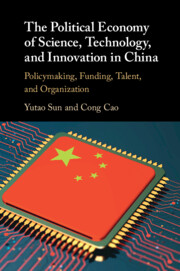 The Political Economy of Science, Technology, and Innovation in China
The Political Economy of Science, Technology, and Innovation in China Talent-Attracting Programs
Published online by Cambridge University Press: 07 August 2023
In examining the effect of Chinese talent-attracting programs launched by the Chinese government, with few exceptions, studies have rarely assessed these programs empirically and pertinently. We intend to fill the gap by assessing an important central government program – the Youth Thousand Talents Program – in Chapter Five. We start with proposing a transnational migration matrix of the academics to clarify the dynamic mechanism of achieving an academic brain gain at the high end. The transnational migration matrix suggests that the academics with high ability have competitiveness in both overseas and domestic academic job markets and can especially enjoy a higher salary and academic reputation in the host (overseas) academic job market due to the more mature mechanism of academic evaluation relative to their home country. The results show that some scholars whose last employer’s academic ranking is among the world’s Top 100 have stronger willingness to return. Compared to scholars with an overseas tenure-track position, those with a tenure position or a permanent position tended to stay overseas, the rate of their staying abroad increased with ages.
To save this book to your Kindle, first ensure no-reply@cambridge.org is added to your Approved Personal Document E-mail List under your Personal Document Settings on the Manage Your Content and Devices page of your Amazon account. Then enter the ‘name’ part of your Kindle email address below. Find out more about saving to your Kindle.
Note you can select to save to either the @free.kindle.com or @kindle.com variations. ‘@free.kindle.com’ emails are free but can only be saved to your device when it is connected to wi-fi. ‘@kindle.com’ emails can be delivered even when you are not connected to wi-fi, but note that service fees apply.
Find out more about the Kindle Personal Document Service.
To save content items to your account, please confirm that you agree to abide by our usage policies. If this is the first time you use this feature, you will be asked to authorise Cambridge Core to connect with your account. Find out more about saving content to Dropbox.
To save content items to your account, please confirm that you agree to abide by our usage policies. If this is the first time you use this feature, you will be asked to authorise Cambridge Core to connect with your account. Find out more about saving content to Google Drive.